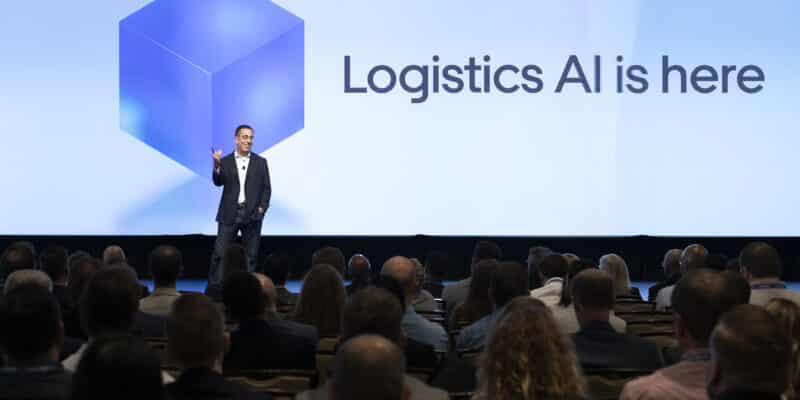Uber Freight founder and CEO Lior Ron on how AI will transform logistics

2023 was the year everyone joined the conversation about artificial intelligence (AI). Gartner is calling it “peak hype,” AP referred to it as a public awakening, and AI scientist Fei Fei Lee says we’ve reached “an inflection point.” From panel discussions among the world’s most knowledgeable experts to casual dinner table discussions with family and friends, talk of AI is popping up everywhere.
You might even be a bit tired of hearing about it. Particularly since, often, this conversation does little to demystify basic questions like: how does AI work—and more importantly, how will it impact my industry and job?
Earlier this month, Uber Freight founder and CEO Lior Ron set out to answer these questions for the logistics industry.
“Throughout many stops in my career, I’ve witnessed the potential impact that artificial intelligence can have on all of us,” said Lior.
Lior himself has spent the entirety of his career researching and finding practical applications for AI. In his recent talk, “Unlocking the future of logistics with AI,” he outlined the evolution of AI in freight and shared what’s to come. By understanding the path forward with AI, logistics leaders can confidently leverage the technology to optimize operations, save costs, and improve service across logistics.
“Very soon, we will see AI completely revolutionizing logistics,” he said.
Digital transformation is foundational for AI adoption
With AI technology, a computer can make complex decisions and suggestions about freight networks. But before that can happen, those physical networks must be accessible to computers. That means digital transformation is the first step toward enabling AI. Logistics leaders can’t make the most out of their AI tools unless the information they use is digitized. Companies still relying on analog processes are missing out on the opportunity to streamline their logistics for faster, more accessible workflows.
“Once things are digitized and once things are connected, then magic happens on top,” said Lior.
Automation offers enormous efficiency, whether that means automatically porting regular loads into the TMS, or the automatic tracking of load progress. By automating processes, logistics teams can lay the groundwork for AI tools to later make and implement decisions as needed—no delay waiting for manual approval.
Machine learning enables rapid, optimized decision-making
The fundamental building block of AI technology in logistics is machine learning. Just like analysts are trained to consider different types of network information to make informed recommendations, computers need to be trained in decision-making and adaptation. Because they’re trained on vast datasets, these AI models don’t just harness the calculation speed of a computer, but also a breadth and depth of learning far beyond an individual human’s capacity.
In logistics, models are trained on domain-specific information to improve freight operations. For instance, a machine learning model can help automatically select the best carrier for each load. Rather than needing to wait for a human to review all their available loads and carriers to make the appropriate matches, machine learning allows a computer to rapidly consider factors like destination, timing, and carrier performance, and instantly match each load to its optimal carrier.
Because these models have instant access to massive amounts of data, machine learning also fuels proactive recommendations for cost savings and operational efficiency. As Lior noted, load bundling is a great example: by pairing compatible routes, technology can eliminate deadhead, allow carriers to better use their time, and offer shippers savings. Machine-learning-fueled technology has been in play in freight for a few years, but as larger, more sophisticated models are trained, its potential continues to grow.
The future of freight: harnessing AI insights
Digitization, automation, and machine learning together lay the groundwork for the most advanced AI technology available—the same one everyone across industries is buzzing about: generative AI.
Generative AI is a type of AI model that uses an advanced form of machine learning to understand text input and produce nuanced answers to complex questions. It’s reshaping the world of freight with in-depth, precise analysis, offered on-demand. Because AI models have real-time visibility into shipment journeys and past performance, they help logistics teams make strategic changes for service improvements.
Today, understanding which routes are performing best in a certain region is a time-consuming, resource-intensive process. This means business-critical insights are delaying key decisions—or in some cases, business-critical decisions are being made without critical business insights. By using tools that are powered by generative AI, logistics teams can gain more informed, domain-specific expertise on demand, which, in turn, help them make more proactive decisions that boost their quality of service and save on costs.
The road ahead
From instant insights to process optimization, AI already has a lot to offer the world of freight. AI’s role in logistics is still evolving. In some cases, even basic digitization still needs to happen. Still, regardless of a business’ digital maturity, understanding AI technology can empower logistics leaders to locate future opportunities and business advantages.
“I hope that all of us collectively can leverage the huge opportunity we see in artificial intelligence,” Lior said at the end of the talk. “This is a call to get ready for what’s to come.”
Missed out on Lior’s tech talk? Watch the full session here.
Interested to start leveraging AI in your logistics operations? Take the first step and learn more about InsightsAI.

